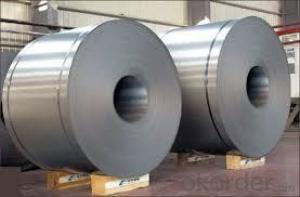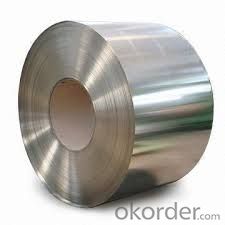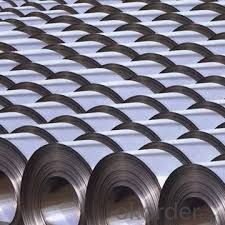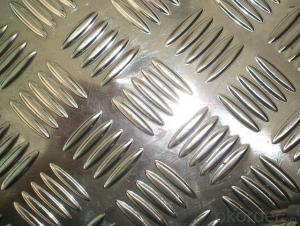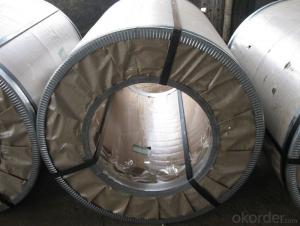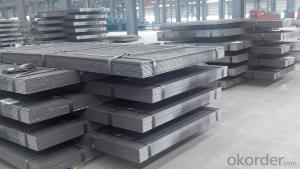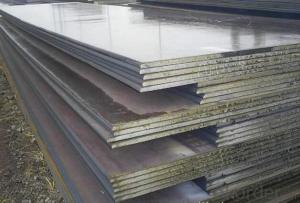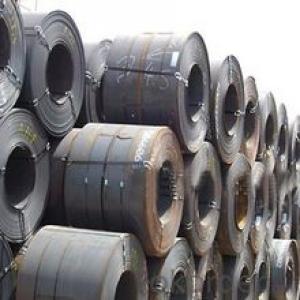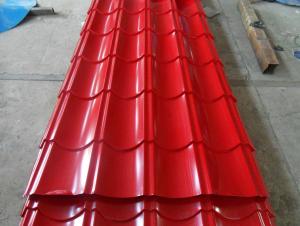Steel Rolled Coil Q345 Hot Rolled Steel Coil
- Loading Port:
- Shanghai
- Payment Terms:
- TT OR LC
- Min Order Qty:
- 50 m.t.
- Supply Capability:
- 60000 m.t./month
OKorder Service Pledge
OKorder Financial Service
You Might Also Like
Hot rolled coils/plates
Type: steel coil and steel plates
Material: SS400-Q235-Q345-SPHC
Width:1250mm 1500mm 1800mm 2000mm
HOT-ROLLED COIL/PLATES(Material: SS400-Q235A/B-SPHC) | |||
2.00*1250/1500L | 3.50*1250/1500L | 5.75*1250/1500L | 11.50*1250/1500L |
2.30*1250/1500L | 3.75*1250/1500L | 7.50*1250/1500L | 11.75*1250/1500L |
2.50*1250/1500L | 4.50*1250/1500L | 7.75*1250/1500L | 13.50*1250/1500L |
2.75*1250/1500L | 4.75*1250/1500L | 9.50*1250/1500L | |
3.00*1250/1500L | 5.50*1250/1500L | 9.75*1250/1500L | |
PATTERN-ROLLED COIL/PLATES(Material: Q235A-Q235B) | |||
3.00*1250L | 3.75*1250L | 4.75*1250L | 5.75*1250L |
3.50*1250L | 4.50*1250L | 5.50*1250L | 7.50*1250L |
MIDDEL-PLATE(Material: Q235A/B-Q345A/B) | |||
8*1800/2000L | 16*1800/2000L | 25*1800/2000L | 45*1800/2000L |
10*1800/2000L | 18*1800/2000L | 30*1800/2000L | 50*1800/2000L |
12*1800/2000L | 20*1800/2000L | 35*1800/2000L | |
14*1800/2000L | 221800/2000L | 401800/2000L | |
Name | galvanized steel coil dx52d z gi |
Grade | GB/T-12754: 2006, JIS3302, EN 10142, ASTM A653, JIS G3302, SGCC/SGCH, GB/T2518, European Standard, ASTM A792, JIS G3321, JIS G3317 |
BASE PLATE | Cold rolled steel sheet, hot dipped zinc coated steel sheet hot dipped A-Z coated steel sheet |
EQUIPMENT | Double coating double baking; |
CAPACITY | 5000Mt/week |
SIZE | Thickness 0.18mm—2mm, width 40mm—1250mm |
ZINC COATING | 40g-275g /m2 |
PAINT THICKNESS | Top:20+-5um, back:5-7um |
COIL WGT | 3Mt - 8Mt |
COIL ID | φ508mm,φ610mm |
BASE SHEET | Cold rolled steel sheet, hot dipped zinc coated steel sheet (small, regular or zero spangle), hot dipped A-Z coated steel sheet |
SURFACE PAINT | EP, PE, HDP, SMP, PVDF |
COLOR SERIES | RAL color number series |
Applications of cold rolled steel sheet coil :
1) Automotive bodies: filters, fuel tanks, etc.
2) Construction materials: roofings, welding pipes,
3) Electric and electronic appliances: computer cans, etc.
4) Steel cans: containers, etc.
5) Steel furniture: washing machines, refrigerators, microwaves, etc.
6) Drums
7) Office equipment: printer, recorders, etc.
8) Motors and transformers
Process of cold rolled steel sheet coil :
Pay off reel-double cut shear-welder-notcher-entry accumulator-pre cleaning section-furnace-hot bridle-zinc pot-air knife-after cooler-water quench-dryer- skin pass mill-dryer-tension leveler-dryer-chemical coater-chemical oven-cooler-exit accumulator-oiler-exit shear-tension reel.
Features of cold rolled steel sheet coil :
1) cold rolled steel coils prices is manufactured to have a long durability, strong corrosion resistance and shiny surface.
2) cold rolled steel coils prices features excellent forming properties, paintability, weldability, and is suitable for fabrication by forming, pressing and bending.
- Q: Can steel sheets be used for insulation?
- No, steel sheets cannot be used for insulation as they conduct heat and do not possess insulating properties.
- Q: What are the common thicknesses for aluminum-coated steel sheets?
- The common thicknesses for aluminum-coated steel sheets typically range from 0.015 inches to 0.125 inches.
- Q: What are the common tolerances for steel sheets?
- The common tolerances for steel sheets typically depend on factors such as the thickness of the sheet, the type of steel used, and the specific manufacturing processes involved. However, some general tolerances for steel sheets can range from +/- 0.005 inches to +/- 0.030 inches, depending on the specific industry standards and customer requirements.
- Q: What are the common thicknesses for galvanized steel sheets?
- The common thicknesses for galvanized steel sheets range from 0.4mm to 3mm, with the most commonly used thicknesses being 0.8mm, 1mm, and 1.2mm.
- Q: Can the steel sheets be easily formed into curves or angles?
- Yes, steel sheets can be easily formed into curves or angles using various techniques such as bending, rolling, or shaping.
- Q: Are steel sheets suitable for agricultural machinery?
- Yes, steel sheets are suitable for agricultural machinery due to their inherent strength, durability, and resistance to wear and tear. Steel sheets can withstand heavy loads, harsh weather conditions, and various forms of physical stress commonly encountered in agricultural operations. Additionally, steel offers flexibility in terms of fabrication, allowing for the customization and adaptation of machinery components to meet specific agricultural needs.
- Q: Can steel sheets be used for radiation shielding?
- Yes, steel sheets can be used for radiation shielding. Steel is a dense material that effectively blocks and attenuates various forms of radiation, making it suitable for shielding applications in industries such as nuclear power, healthcare, and aerospace.
- Q: Can steel sheets be used for manufacturing furniture?
- Yes, steel sheets can be used for manufacturing furniture. Steel is a strong and durable material that can be shaped and formed into various furniture designs. It offers a sleek and modern aesthetic and can be used for making chairs, tables, shelves, and other furniture pieces.
- Q: What is the lifespan of a steel sheet?
- The lifespan of a steel sheet can vary depending on various factors such as the quality of the steel, the environment it is exposed to, and the level of maintenance and care it receives. However, on average, a well-maintained steel sheet can last anywhere between 20 to 30 years or even longer.
- Q: How are steel sheets protected against rusting?
- Steel sheets are protected against rusting through a process called galvanization. This involves coating the steel sheets with a layer of zinc, which acts as a protective barrier against moisture and oxygen, preventing rust formation. Additionally, other methods such as painting or applying corrosion-resistant coatings can also be used to further enhance the protection against rusting.
Send your message to us
Steel Rolled Coil Q345 Hot Rolled Steel Coil
- Loading Port:
- Shanghai
- Payment Terms:
- TT OR LC
- Min Order Qty:
- 50 m.t.
- Supply Capability:
- 60000 m.t./month
OKorder Service Pledge
OKorder Financial Service
Similar products
Hot products
Hot Searches
Related keywords
